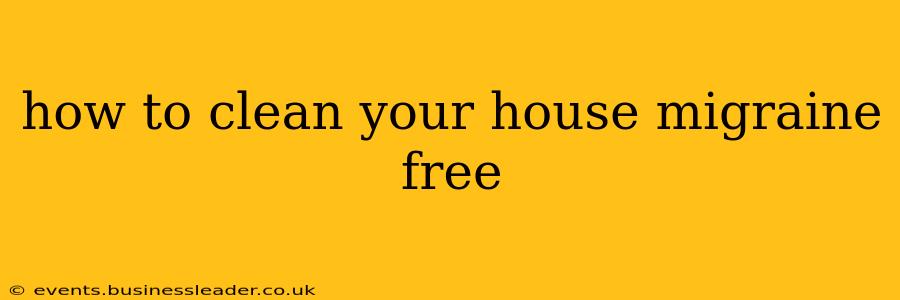Migraines can be debilitating, and the last thing you need when suffering from one is the added stress of housework. Cleaning, with its often overwhelming smells, intense physical exertion, and exposure to irritating dust and chemicals, can easily trigger a migraine or worsen existing symptoms. But a clean home doesn't have to come at the cost of your health. This guide offers strategies to help you maintain a clean house while minimizing migraine triggers.
What Triggers Migraines During Cleaning?
Before we dive into solutions, let's identify common cleaning culprits:
- Strong Smells: Harsh chemicals in cleaning products (bleach, ammonia, strong fragrances) are notorious migraine triggers. Even seemingly pleasant scents can be problematic for some.
- Dust and Allergens: Dust mites, pet dander, and pollen are common allergens that can set off migraines.
- Physical Exertion: Overexertion from scrubbing, lifting, and bending can lead to headaches and intensify migraine symptoms.
- Dehydration: Forget to drink water while cleaning? Dehydration is a common migraine trigger.
- Stress: Feeling overwhelmed by a messy house and the task of cleaning can significantly increase stress levels, often leading to a migraine.
- Fluctuations in Light: Bright, harsh lighting can be a migraine trigger for many.
How to Minimize Migraine Triggers While Cleaning
Now that we understand the common culprits, let's explore strategies to mitigate them:
1. Choose the Right Cleaning Products
Opt for natural and fragrance-free cleaning products. Look for products labeled "fragrance-free," "unscented," or those made with natural ingredients like vinegar, baking soda, and lemon juice. These gentler options significantly reduce the risk of chemical-induced migraines.
2. Break Down the Cleaning into Smaller Tasks
Don't try to do everything at once. Cleaning your entire house in one go is a recipe for exhaustion and a potential migraine trigger. Instead, break down the cleaning into smaller, more manageable tasks. Spend 15-20 minutes on one area, then take a break. This approach is less physically demanding and prevents overwhelming stress.
3. Stay Hydrated
Keep a water bottle nearby. Dehydration is a known migraine trigger, so staying well-hydrated throughout your cleaning session is crucial. Sip water regularly to prevent dehydration.
4. Control the Environment
Adjust lighting to a softer, less intense level. Use dimmable lights or natural light where possible. Open windows for fresh air (unless pollen is a trigger), but be mindful of dust. A gentle breeze can be helpful.
5. Wear Protective Gear
Consider wearing a dust mask. This will help prevent inhalation of dust and allergens, minimizing potential triggers.
6. Prioritize and Delegate
Focus on high-impact cleaning areas. Don't worry about achieving perfection. Concentrate on cleaning the areas that impact you most, such as frequently used surfaces and high-traffic areas. If possible, delegate tasks you find particularly challenging.
7. Manage Stress
Listen to calming music or an audiobook. Engaging in relaxing activities while cleaning can reduce stress levels and make the process more enjoyable. Taking short breaks to meditate or practice deep breathing exercises can also be beneficial.
8. Post-Cleaning Self-Care
Reward yourself after cleaning. Treat yourself to a relaxing bath, a good book, or a quiet cup of tea. This positive reinforcement makes the whole process less stressful.
Frequently Asked Questions (FAQs)
What are the best natural cleaning products for migraine sufferers?
Vinegar (white distilled), baking soda, and lemon juice are excellent natural cleaning agents. They're effective, readily available, and virtually fragrance-free. You can easily find many DIY recipes online for homemade cleaning solutions.
How can I prevent dust from triggering migraines while cleaning?
Use a microfiber cloth to trap dust rather than spreading it. Dampen the cloth slightly for even better dust collection. Consider using a HEPA filter vacuum to remove dust mites and other allergens from carpets and upholstery.
Can essential oils help or hurt migraines during cleaning?
Essential oils are a double-edged sword. While some people find certain scents relaxing, others find them intensely triggering. Avoid using essential oils unless you know they're safe for you, and always use them sparingly.
Should I clean my house when I have a migraine?
No. If you're experiencing a migraine, prioritize rest and recovery. Cleaning can worsen your symptoms. Wait until your migraine subsides before resuming cleaning tasks.
By implementing these strategies, you can create a cleaner home without triggering your migraines. Remember that every individual is different, so experiment to find what works best for you. Prioritize your health and well-being – a clean house is important, but your health is paramount.
